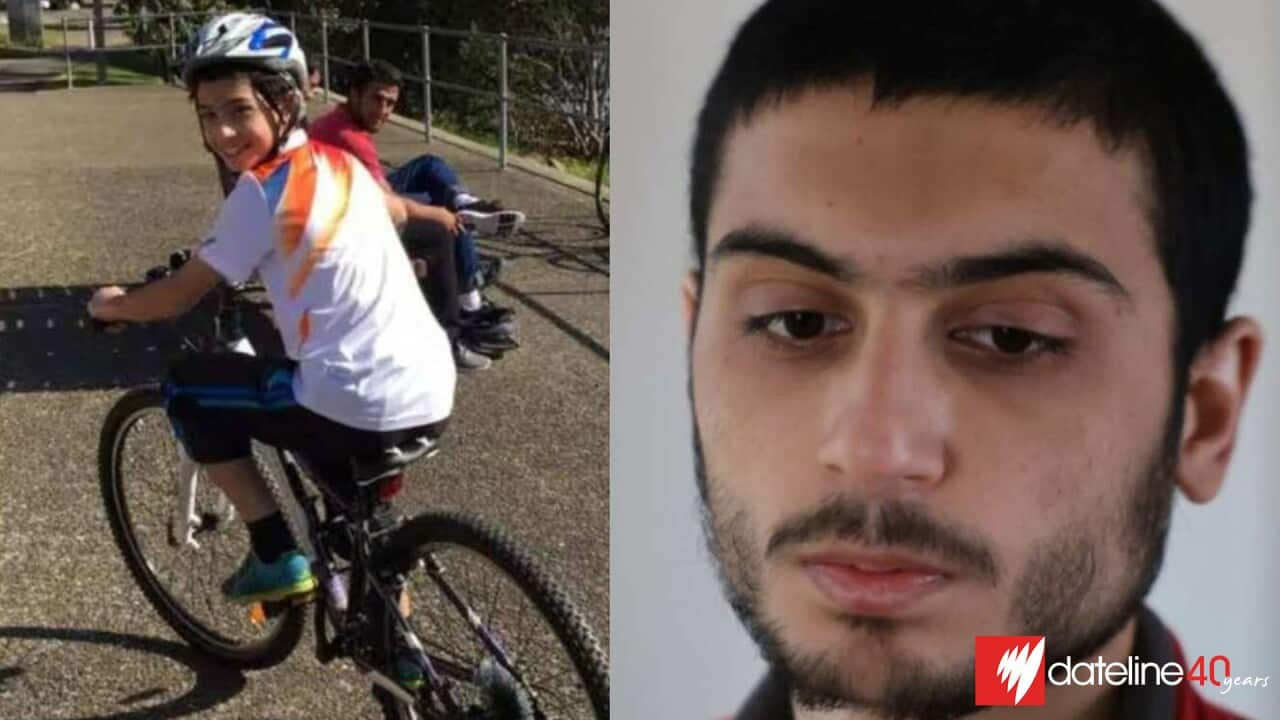In an undisclosed military location in a Kurdish-controlled part of northeast Syria, Yusuf Zahab enters a spartan meeting room. Armed guards wait outside as he sits down to speak to SBS Dateline, the first Australians he says he has met seen since 2019.
"I just want to go back home. I want to see my mother," he says.
"I wish to go back to Australia. I wish to go back to my normal life I used to live 10 years ago. I wish to see my family again."
Born in Sydney, Yusuf Zahab says he was 12 when he went on holiday with his family to Lebanon and Türkiye. He says he knew nothing about the plan to go to Syria to live under the self-proclaimed Islamic State group (IS).
"I didn't understand what was going on until the day my mother, my father and my brother Kaled was telling me to run. I was scared and I was holding my mother's hand," Yusuf, who is now in his early 20s, recalled in his first interview with Australian media.
In 2014, IS joined the rebellion against Syrian President Bashar al-Assad that had started in 2011 and captured large areas of territory in the country.
It attracted tens of thousands of foreign fighters, including more than 200 from Australia.
When IS was defeated in 2019, around 40,000 wives and children of IS fighters were placed in detention camps.
As the US-backed Kurdish forces captured the last of the IS caliphate's territory, at age 15, Yusuf was separated from his mother and detained without charge in a men's prison alongside former IS fighters. In 2022, his family in an IS attack on the Al-Hasakah prison in Syria, where he was held at the time.
But then last year Australian officials showed a proof-of-life video to one of Yusuf's cousins in Australia, revealing he may have survived the prison attack.
Dateline was granted access to interview Yusuf by the Kurdish authorities that govern the northeastern Syrian region.
Yusuf's mother Aminah burst into tears upon hearing the news her youngest son was alive and then seeing his photo.
"It's the best news. I think it's the best news ever in my entire 57 years of my life," she told Dateline journalists who visited her in the Al-Roj detention camp in Syria.
The full documentary will appear on SBS Dateline in the coming weeks.
"The Department of Foreign Affairs and Trade is providing consular assistance to the family of an Australian man currently detained in Syria. Owing to privacy considerations, we are unable to provide further comment," DFAT spokesperson said in a written statement to Dateline.
"Our ability to provide consular assistance to Australians in Syria is severely limited due to the security situation," the statement read.
DFAT didn't reply to Dateline's question on whether Australian authorities had had direct contact with Yusuf since he was detained by Kurdish forces in 2019.
Hopes for repatriation
Yusuf was the youngest of four siblings. His eldest brother Muhammad Zahab was known to be a senior member within the IS structure. He is thought to have delivered more than a dozen family members into IS, including his parents and three siblings.

Source: Supplied
"I always think it is because of my brothers … It's because of them," he said. "That's why my mother, father, me, that is why I think they got us here. They got us into all this trouble."
Kaled was trained to become an IS fighter and was reportedly killed in an airstrike shortly after he arrived in Syria. Muhammad was killed in an Iraqi airstrike in 2018. Some of their wives and children were repatriated to Australia in October 2022.
Their mother Aminah and sister Sumaya remain in Al-Roj.

Yusuf Zahab, now in his 20s, sat down for an interview with SBS Dateline, his first with the Australian media. Credit: SBS Dateline
There are approximately 14 prisons in the regions that contain some 2,000 foreign prisoners from 58 countries, according to a 2023 report by US think tank RAND Corporation.
SDF officials say countries such as Australia need to repatriate all women, children and men from the region, claiming they are too under-resourced to properly detain or trial these prisoners.
In October 2022, the Australian government four women and their 13 children from detention camps in north-east Syria, following the repatriation of 18 orphaned minors in 2019. At least , according to Save the Children Australia.
Kamalle Dabboussy, Yusuf's uncle by marriage and Kaled’s father-in-law, spoke to Dateline of the pain that the family felt not knowing what had happened to Yusuf.
"The family have had to go through absolute agony … this whole roller coaster of emotions and the almost torturous aspect of lack of information, speculation."
Dabboussy is also an advocate and spokesperson for families with relatives still remaining in Syrian detention camps. While his daughter Mariam Dabboussy has returned to Australia, he continues to push for the Australian government to repatriate other families from the region.
"If anyone believes that keeping them there is some form of justice, well, there is no justice until you have [your] day in court," he said.
"So they need to be dealt with as any other Australian should be dealt with. Make the accusations in a proper court of law, allow them to write a defence and let a judge there make a decision."












